Proper nutrition is fundamental to a teenager’s growth and development. But getting the right balance of calories, protein, fiber, and vitamins can be a challenge with a teen’s busy lifestyle. One study even found that less than 16% of 15-year-olds have a balanced diet (1).
Protein shakes have become more popular over the years as a convenient and simple solution for teens to get their protein. But do they really need them? And which protein shakes are right for your teen?
In this blog post we will cover if protein shakes are necessary for your teen, what to look for, and exact brands that are dietitian-approved.
So let’s jump in!
How much protein do teens need?
The daily recommended protein intake for a teenager is 0.85 grams of protein per kg of body weight (2). This amount is to help maintain current muscle mass status.
However, for an athlete, the protein recommendations are slightly higher. The American dietetic Association and American College of Sports Medicine recommends 1.2-1.8 grams per kg of body weight (3).

Groups with higher protein needs
There are many reasons why teenagers might need more protein than average. Activity level, metabolic rate, age, and weight all effect protein needs.
Groups with higher protein needs include:
- Athletes
- Underweight
- Picky Eaters
- After Surgery or Chronic Illness
- Pediatric Conditions including Type 1 Diabetes, Cancer, and Chrons disease
Are protein shakes necessary?
Supplementing with protein shakes or powders is not necessary to meet a teenager’s daily protein needs. Even for teen athletes!
The average teenager is actually already consuming more than their daily protein goal without protein supplements (4).
As with any supplement, protein shakes should not take the place of whole foods. A teenager should focus first on a balanced diet first, and lean on supplements if they are having trouble obtaining enough protein each day.
However, the reason why protein shakes are popular among teenagers is the convenience and variety that they offer. For many teens, lack of accessibility and lack of flavor variety are the biggest boundaries to meeting their protein goals.
So although they are not a necessity, protein shakes can be a great addition to a already healthy diet!
Alternatives to protein shakes
Whether it’s taste preference or cost, sometimes a protein shake is not right for your teenager. However, there are many other ways to increase protein in their diet.
Try adding these foods into their next meal or post-game snack.
- Yogurt
- High protein milk, like fairlife or mootopia
- Cottage cheese
- Chicken
- Turkey
- Lean Pork
- Lean Beef
- Eggs
- Egg Whites
- Beans or Lentils
- Edamame
Side effects of too much protein?
It’s important to know your teenagers daily protein goal, because there is such thing as too much protein! Excess protein consumption in adolescence has been linked to obesity, decreased renal function, and increased cholesterol (2,5).
However, these risks are only associated with adolescents who consistantly eat beyond the recommended daily value.
This is why knowing your teen’s daily protein goal (calculated above based on weight) can help you decide if protein shakes are necessary.
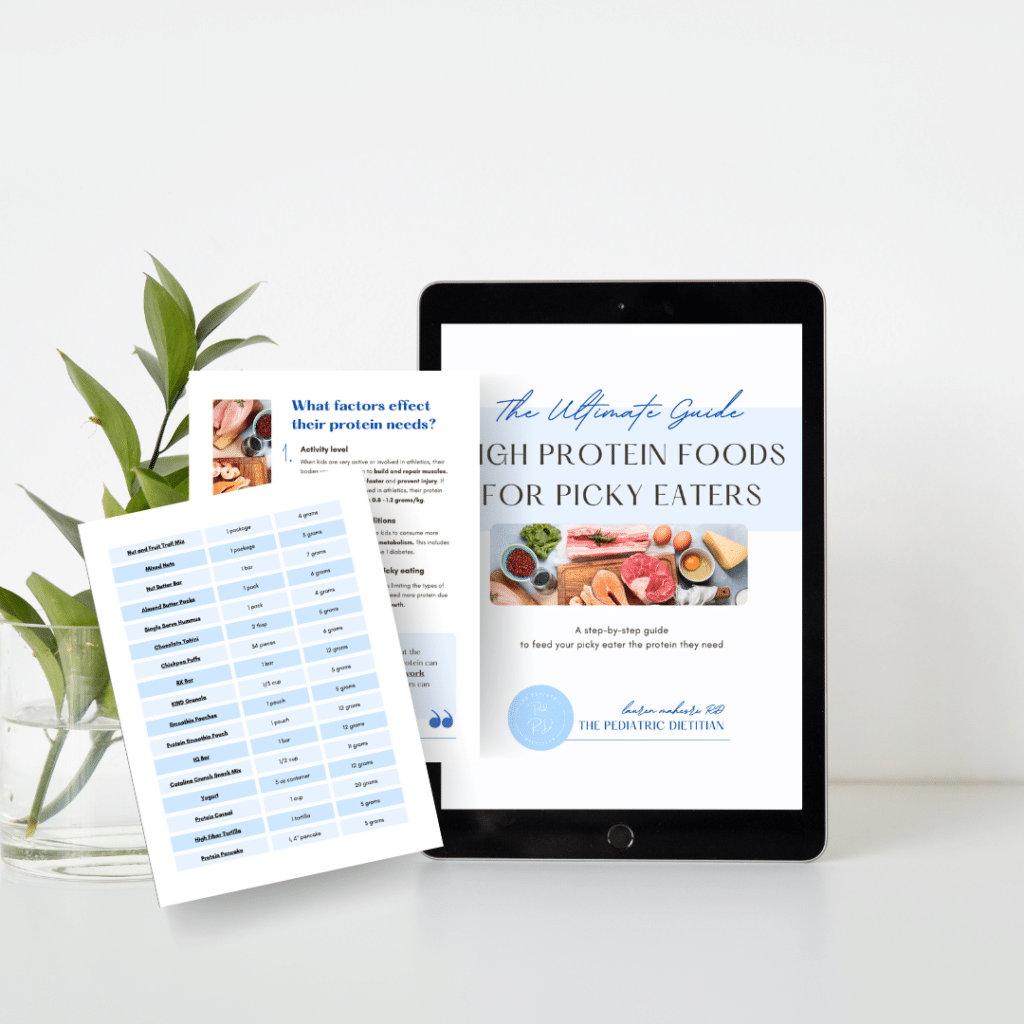
Want more high-protein foods for picky eaters?
Download the Ultimate Guide now!
Get access to 90+ high-protein food ideas, 40+ recipes, and tips to get your picky eater to eat more protein.
Protein Shake Checklist
Many protein shakes target difference audiences. So we want to know what we’re looking for!
Several factors I look at when recommended protein shakes to teens include:
1. Ingredient regulation
The supplement industry is wildy unregulated, and that goes for protein shakes as well. To ensure the safety of the product, look for:
- All ingredients are listed or disclosed (rather than a “proprietary blend”)
- FDA regulated, the NSF (National Science Foundation) logo, or stating that the ingredients are third party tested
2. 20-30 grams of protein
Of course, every teen needs a different amount of protein, but 20-30 grams of protein is the average I recommend. Please adjust for your teen’s individual needs.
3. Less than 5 grams of added sugars
Just like any “health food”, protein shakes have the opportunity to be a wolf in sheep’s clothing – and not provide much quality nutrition at all! That’s why a big factor is limiting added sugars.
4. Quality protein
Whether you are looking for an animal based or plant based protein, you want to make sure it is high quality. For animal based products, look for “whey isolate” rather than “whey concentrate” to get more pure protein.
For plant based sources, look for multiple sources of plant based proteins combined, like pea protein AND brown rice protein. This leads to more balanced amino acid profile, aka “complete protein”.
5. Minimal ingredients for sensitive stomachs
For some teens with sensitive stomachs, certain additives in protein shakes can cause bloating, gas, or GI pain.
If there are any concerns for this, I recommend a protein shake with minimal ingredients and avoiding shakes with gums or artificial sweeteners.
6. Bonus points: micronutrients & fiber
Extra vitamins and minerals are always a win! Especially if these protein shakes are aiming to be a full meal replacement, we want them to be well-rounded.
The Best Protein Shakes for Teens
Isopure – Best Powdered Protein Shake
25 grams of protein, 100 calories
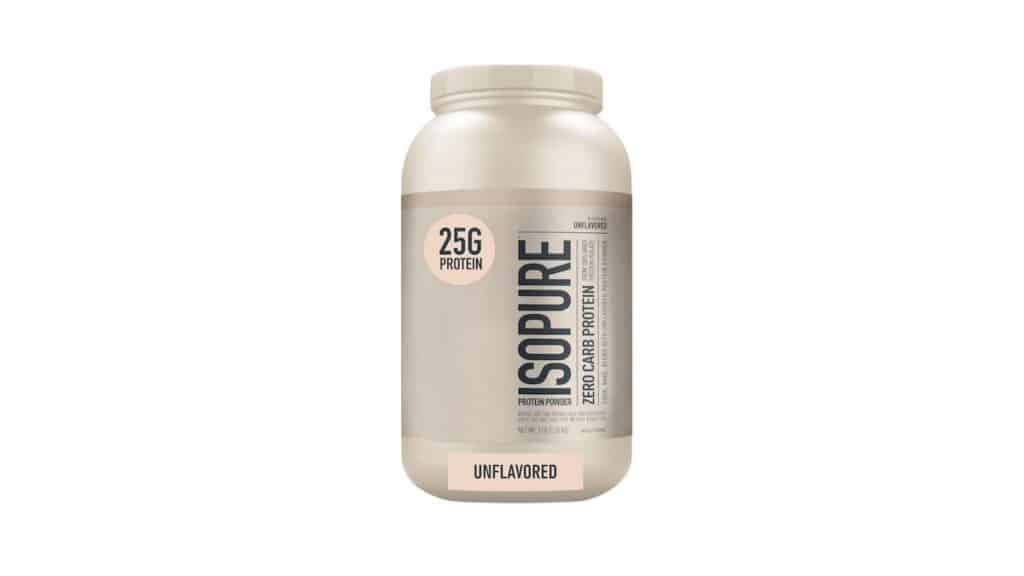
Pros:
- Multiple flavor options (unflavored option as well)
- High quality protein: whey isolate
- Simple ingredients
- Can be used for baking and cooking
- Appropriate for diabetic teens
- Gluten and lactose free
- No added sugars
Cons:
- Not a balanced meal & low in calorie – it needs to be paired with carbohydrates for post-workout fuel
- More expensive than most protein shakes ($1.37 per ounce)
Fairlife – Best Ready to Drink Protein Shake
26 grams of protein, 170 calories
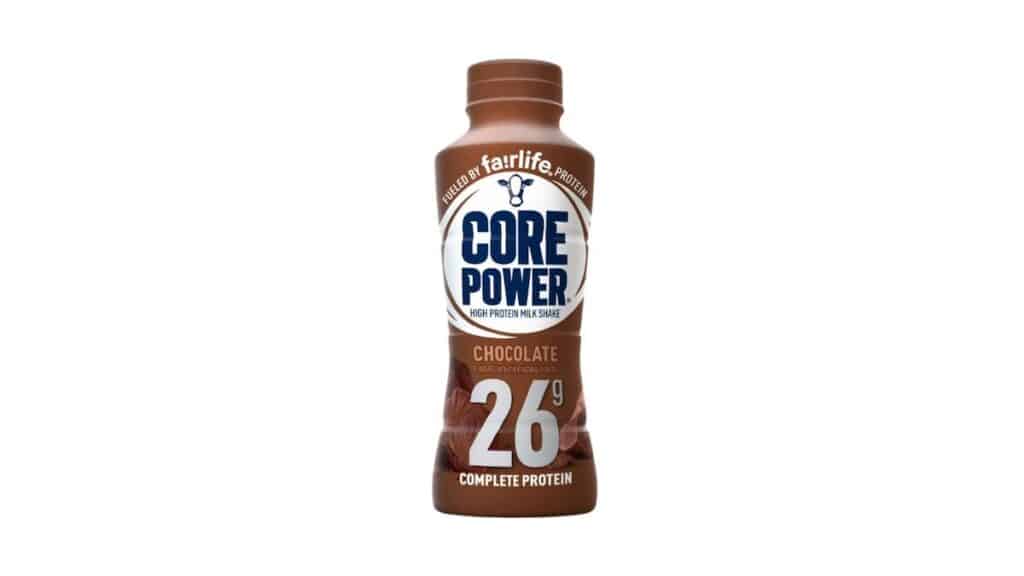
Pros:
- Convenience: pre-mixed and shelf stable to keep in back packs or gym bags!
- Zero added sugars
- No gritty taste that sometimes powders can have
- High flavor variety
- Lactose free
- Easy to access (available at most grocery stores)
Cons
- Not a balanced meal & low in calorie – it needs to be paired with carbohydrates for post-workout fuel
- Uses artificial sugars (sucralose)
Orgain – Best Ready to Drink Vegan Protein Shake
20 grams of protein, 140 calories
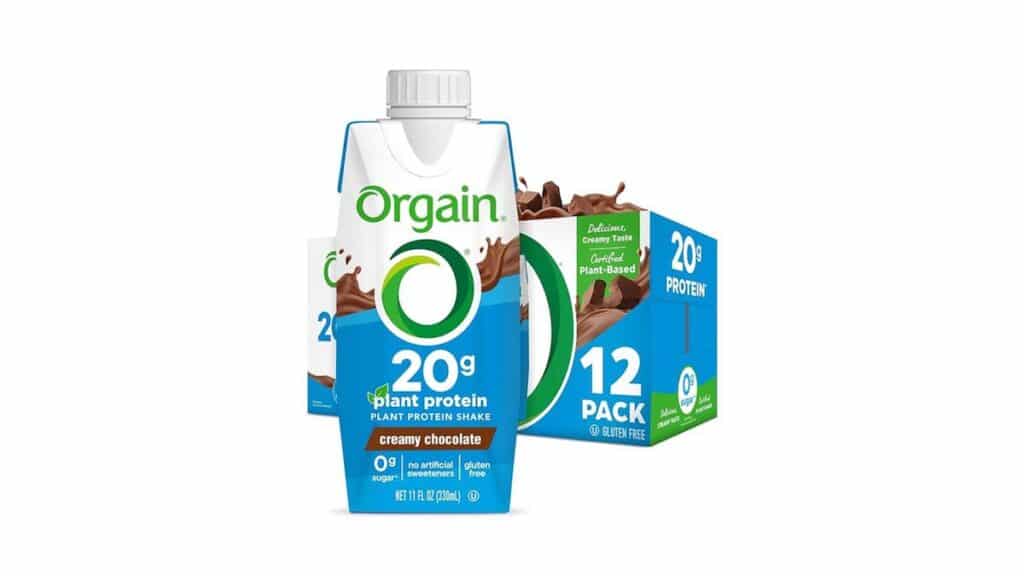
Pros:
- Plant Based
- Convenience: pre-mixed and shelf stable to keep in back packs or gym bags!
- Offer complete proteins (all 9 essential amino acids)
- Gluten free, soy free, lactose free
- Zero added sugar and free of artificial sweeteners
- WAY less gritty texture than other vegan protein shakes
- Easy to access (available at most grocery stores
- 2g of added fiber
Cons
- Not a balanced meal & low in calorie – it needs to be paired with carbohydrates for post-workout fuel
KOS – Best For Sensitive Stomachs
20 grams of protein, 160 calories
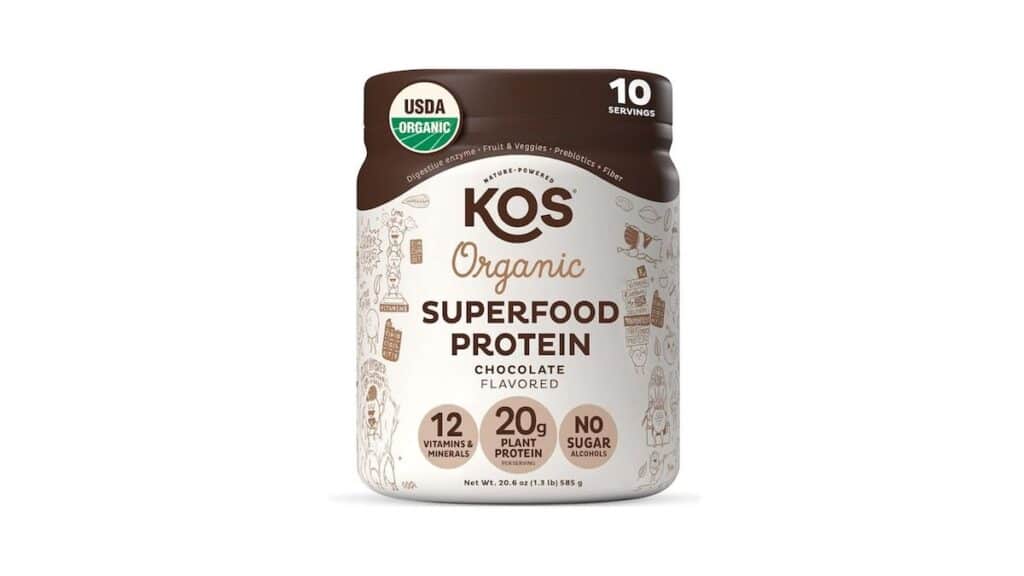
Pros:
- Easy to digest due to added digestive enzymes
- Plant Based
- No sugar alcohols
- Added vitamins and minerals
- 3g of added fiber
Cons
- Higher saturated fat than most protein shakes
- Can be a grittier texture than most protein shakes
Rivalus Clean Gainer – Best for Underweight or Meal Replacement Protein Shake
30g protein, 560 calories
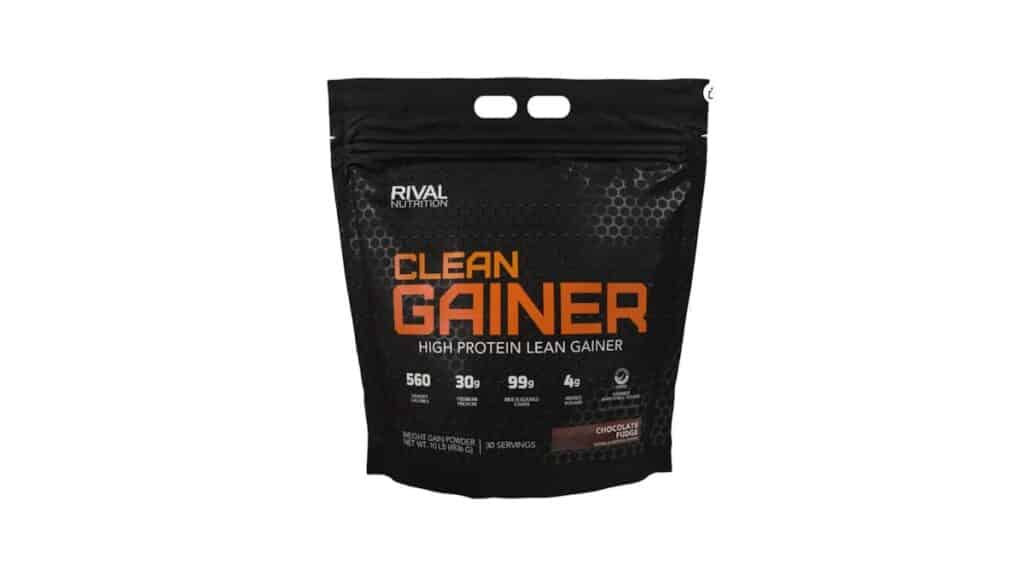
Pros:
- Balanced in fat, protein, and carbohydrates – can be used as a full meal replacement
- Includes healthy fat sources like flax and MCT
- Inexpensive ($0.35 per ounce)
- Variety of flavors
Cons
- Very high carbohydrate (should not be used for diabetics or teens who are overweight)
- Can be gritty in texture
Naked Whey – Best for Underweight or Meal Replacement Vegan Protein Shake
25 grams of protein, 615 calories
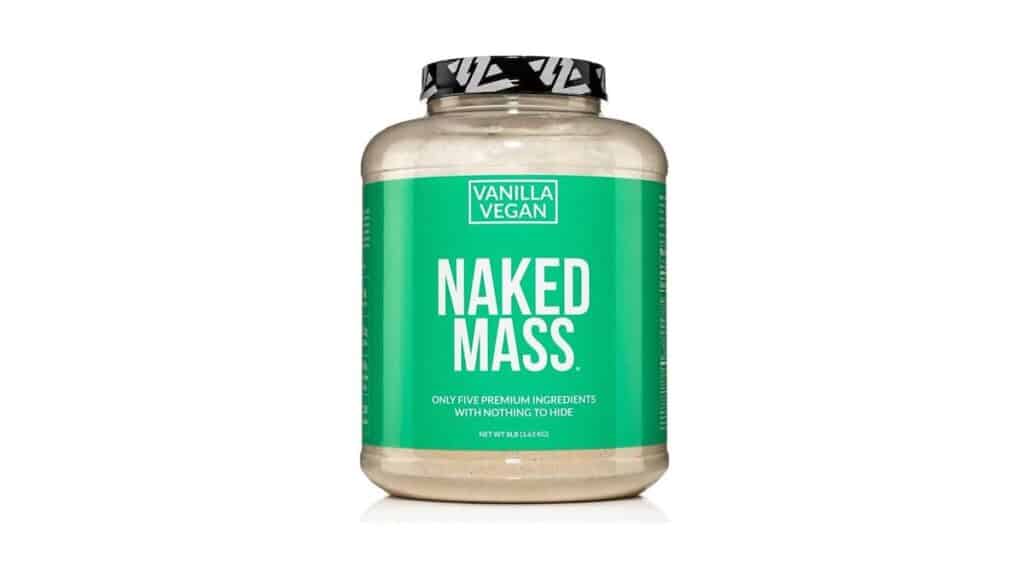
Pros:
- Balanced in fat, protein, and carbohydrates – can be used as a full meal replacement
- High variety of amino acids (complete protein)
- No added sugar or artificial sweeteners
- Low in saturated fat
Cons
- High carbohydrate (should not be used for diabetics)
- Flavored versions are very high in sugar
Protein shake recipes
The key to a great protein shake recipe is helping the protein shake become a full meal. This is done by adding complex carbohydrates and healthy fats. Try these quick and easy protein-packed recipes!
Post Workout Smoothie. I love this recipe because it packs in several fruits and vegetables as well as coconut water for an extra boost of electrolytes.
Peanut Butter Protein Shake. Using nut butters, liek peanut butter, in a protein shake is a great way to add healthy fat and increase calories if needed.
Protein Mug Cake. Protein powders can be used in more than just shakes! This quick mug cake is a great protein-packed nightime snack for teens.
Protein Energy Balls. These protein balls are incredibly easy to make and very easy to change to your teen’s taste preference. Make ahead and pack for lunch or after practice!
For more protein-packed and dietitian approved recipes, see my recipe library here!
This post may contain affiliate links, meaning I will receive a commission if you deicide to make a purchase through my links, at no cost to you. For more information, please read my Terms of Use and Service.

Pingback: 20 High Protein Foods for Picky Eaters
Pingback: 7 Best Protein Shakes for Teens: Boost Growth & Health Safely - HealHint
I’m thoroughly captivated by the keen analysis and excellent way of expressing complex ideas. Your depth of knowledge is evident in every sentence. It’s clear that you spend considerable time into researching your topics, and this effort does not go unnoticed. Thank you for sharing such detailed information. Continue the excellent job! https://rochellemaize.com
awesome
thanks for your comment!
Pingback: 10 Athlete Breakfast Ideas